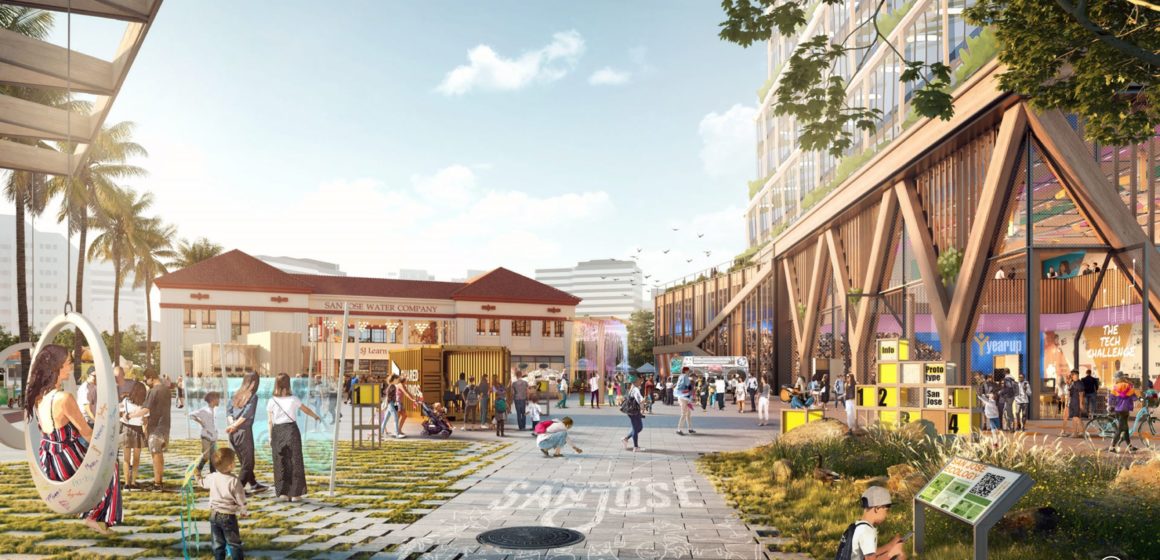A new San Jose advisory group authorized to give out millions in grant funding from Google is now in the making.
Approximately $155 million in funding from the Silicon Valley tech giant will soon be funneled into a 13-member advisory commission appointed by the San Jose City Council. Known as the Community Stabilization and Opportunity Pathways Fund Commission, the group will determine how to disperse millions to communities at risk of being priced out of San Jose, as well as funding education and entrepreneurship opportunities for residents.
Councilmembers unanimously approved a structure and scope of the 13-member committee on Tuesday. The city aims to fill the positions by the end of this year.
Members will be able to serve two consecutive four-year terms. Five of the members will be San Jose residents who have lived experience with homelessness, and eight must have technical experience with housing, mental health, health care or other community services. The commission will also include non-voting members—three city representatives, one Google rep and potentially representatives from other major funders.
Several residents and advocates from nonprofits like Sacred Heart spoke in favor of the goals and structure of the advisory committee.
“This is a really monumental opportunity,” said Huascar Castro, associate director of housing and transportation policy at Working Partnerships USA. “Along with having dollars readily available to combat displacement, we’re also very supportive of this model, where community members with lived experience are going to have the ability to decide how stabilization fund dollars are being allocated.”
Councilmember Dev Davis, who represents part of downtown where a major Google development is planned, said she is excited but hopes to have more participation from residents near the construction.
“There should be a greater level of representation from those neighborhoods that are going to be impacted the most,” Davis said. “But this is a change that will be for all San Joseans.”
Applications to fill the positions will open six to eight weeks after approval. Commissioners will then work to determine the bylaws and hire a fund manager who will administer the grant-making process and recommend qualified grant recipients. The group will then create a five-year plan to distribute funds.
Nanci Klein, director of economic development, said the plans will likely be ready around 2024-25. She said her favorite part of the advisory committee is the way the city will choose who sits on the commission.
“It is putting the decision making in the hands of the people who are closest to the problems who have either experienced the programs themselves, or who are working day in and day out, solve them or make them better,” Klein told San José Spotlight. “I think it hasn’t been done and it’s exciting to be jumping into that.”
When Google’s Downtown West project was approved in May 2021, the tech behemoth agreed to shell out $200 million to help minimize displacement from the thousands of tech workers moving into the downtown to live, which would potentially increase the housing costs.
The multi-billion-dollar development will take about a decade to complete. It will cover 80 acres near Diridon Station, and Google anticipates up to 25,000 people working in its downtown offices. The campus will feature 7.3 million square feet of office space, 4,000 residences, 15 acres of parks and a large community center.
So far, the company has provided $4.5 million for education, job training, scholarships and strengthening neighborhood-serving programs—funding that is not part of the $155 million.
The $155 million was expected to be dispersed after construction finished, but Google voluntarily agreed to make a $15 million payment to the fund within 120 days of starting construction on the first Downtown West office building, city officials said.
Advocates and residents opposed to the Google Downtown West project cited concerns the massive development would increase the cost of living—particularly housing—and create displacement.
Homeless advocate RJ Ramsey said he shares these concerns, but is optimistic about the advisory group.
“I’m ecstatic that the commission is nearing fruition,” Ramsey told San José Spotlight. “For individuals and businesses displaced by the impending Google village, this is a key avenue to regain stability and prosperity.”
Ramsey, who was homeless for several years, said he is particularly excited to have five seats dedicated to people who know what it’s like to live in the streets, cars or without a stable home.
“Usually there is only one seat reserved for those with lived experiences and you feel tokenized and it’s hard to speak up,” Ramsey said. “So this is great because before they vote we can say ‘well, this doesn’t really work’ because we have gone through it.”
Contact Jana Kadah at [email protected] or @Jana_Kadah on Twitter.



Leave a Reply
You must be logged in to post a comment.